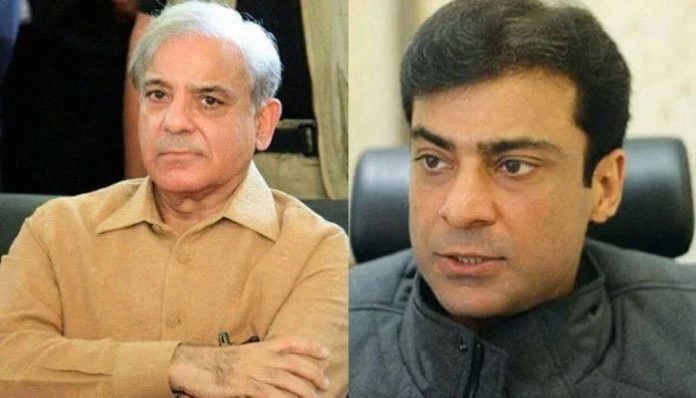LAHORE: Prime Minister Shehbaz Sharif’s counsel Saturday argued that the Rs16 billion money laundering case was “politically motivated” and “based on mala fide intentions” because the PTI government wanted to imprison his client.
The arguments came during the hearing of the money laundering case at the special court (Central-I) where the prime minister and his son Punjab Chief Minister Hamza Shehbaz also appeared.
Strict security measures were been put in place and the court’s premises were evacuated before the duo’s arrival.
During the previous hearing on May 21, the special court had issued arrest warrants for Suleman Shehbaz, son of Prime Minister Shehbaz Sharif, in the case after extending the interim bail of Shehbaz Sharif and Hamza Shehbaz till May 28.
During the course of the proceedings, PM Shehbaz Sharif apprised the court that he had never received his salary, TA and DA from the national kitty, which is around Rs70 to Rs80 million, despite it being his legal right. The prime minister asked if he would launder just Rs2.5 million.
“In this case, I am accused of laundering Rs2.5 million,” said the prime minister.
The prime minister said his family suffered Rs2 billion but he did not give subsidies to favour the sugar mills. Later, he and CM Hamza Shehbaz left the courtroom after being granted permission by the judge.
Amjad Pervaiz, Shehbaz Sharif’s counsel, argued that the prime minister has nothing to do with the accounts opened or closed in the past 10 years.
However, the burden of proof in the case lies with the prosecution, argued Amjad Pervaiz.
He maintained that the PTI-led government’s focus was on imprisoning Shehbaz Sharif and this [money laundering] case is mala fide because it is politically motivated. “The facts in the challan submitted by the FIA were incorrect.”
Referring to the law, the counsel said if there are 10 cases against anyone, then he/she will not be arrested separately in each case.
“The [previous] government knew that this case could not be proved in the court,” the lawyer said, adding that the courts issued their verdicts in favour of his client.
At the outset of today’s hearing, a report about the arrest of co-accused in the case, Suleman Shehbaz, Tahir Naqvi, Malik Maqsood and Ghulam Shabbar was presented before the court.
“Conflicting reports have been received about the arrest of the suspect in the case”, observed Special Court (Central-I) Judge Ijaz Hassan Awan.
“The report states that Model Town address 41D does not exist,” the judge remarked, adding that it was also written that the suspect, Suleman Shehbaz, is out of the country.
At this, FIA prosecutor Farooq Bajwa said that it was a mistake. The author wanted to write that the suspect was not present at the address.
“Where is the investigation officer who prepared this report,” asked the judge.
The prosecutor pleaded with the court to allow the submission of a new report in this regard.
Pointing out the flaws in the report, the judge noted it is said in the report that co-accused, Ghulam Shabbar, has died while at the same time it also said that he was interrogated.
A challan has been submitted about a person who had died, the judge noted and directed the officer to submit a new challan after removing all the bits related to Ghulam Shabbar.
At this, the FIA official told the court that the suspect’s death certificate was a year old and the inquiry had started prior to his death.
Bajwa said he would submit a detailed response on this.
In December 2021, the FIA had submitted the challan against Shehbaz and Hamza before the special court for their alleged involvement in laundering an amount of Rs16 billion in the sugar scam case.
According to the FIA report submitted to the court, the investigation team has “detected 28 benami accounts of the Shehbaz family through which money laundering of Rs16.3bn was committed during 2008-18. The FIA examined the money trail of 17,000 credit transactions.”
The report added that the amount was kept in “hidden accounts” and given to Shehbaz in a personal capacity.
This amount (Rs16 billion) has nothing to do with the sugar business (of Shehbaz family), it claimed. The money received from the accounts of low-wage employees by Shehbaz was transferred outside Pakistan via hundi/hawala networks, ultimately destined for the beneficial use of his family members, the FIA had alleged.
“Eleven low-paid employees of the Sharif group who ‘held and possessed’ the laundered proceeds on behalf of the principal accused, are found guilty of facilitating money laundering. The three other co-accused of the Sharif group also actively facilitated the money laundering,” the agency had said.

















